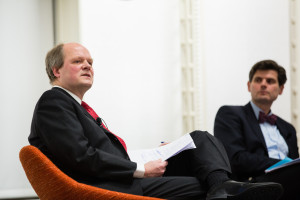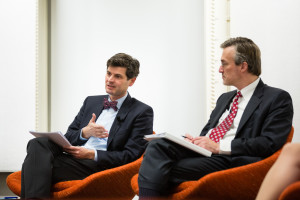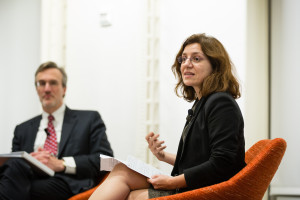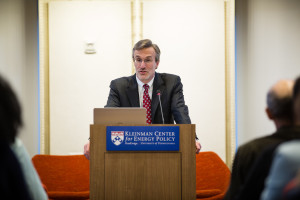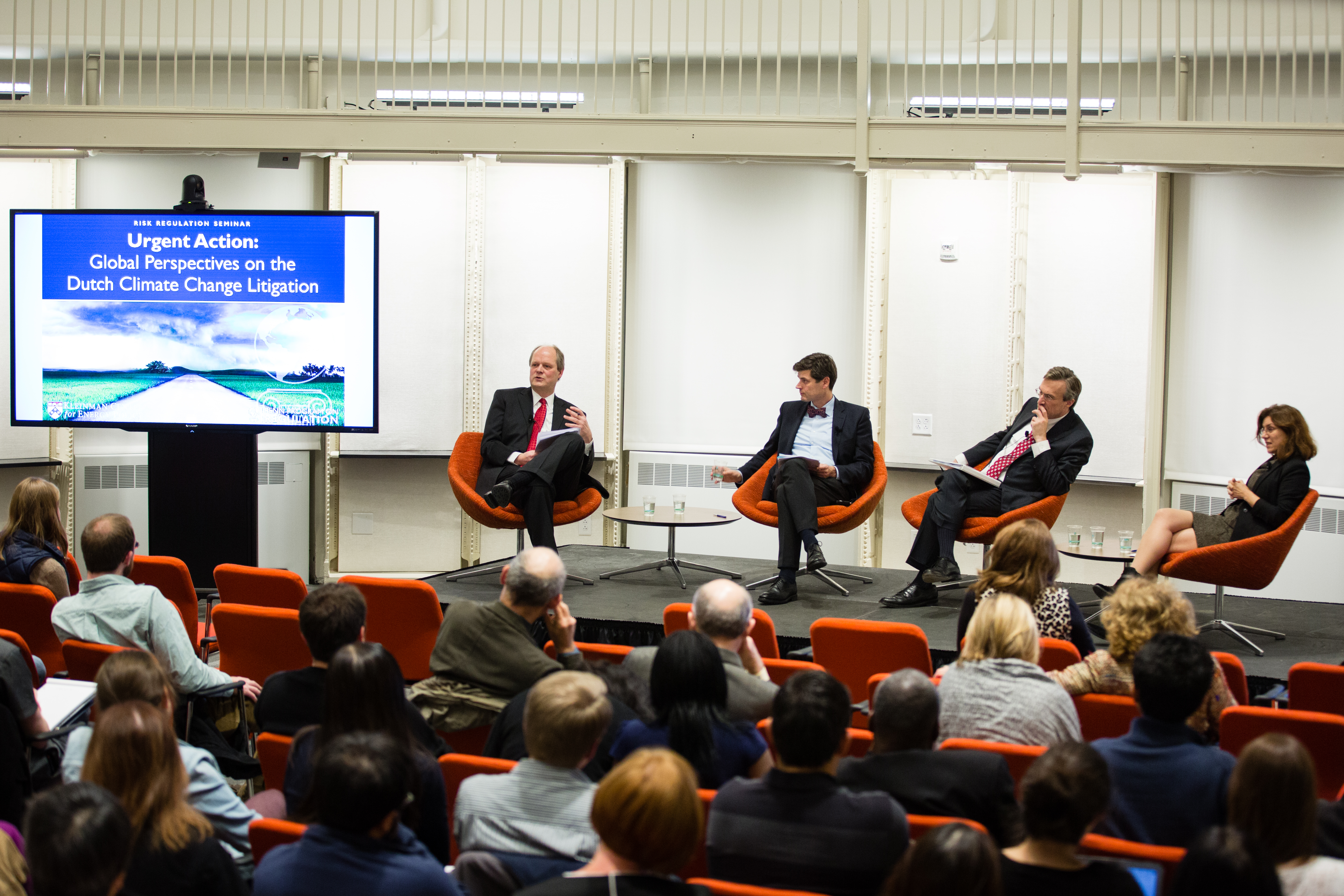
A Penn panel discussion sparked a lively debate about whether courts should shape environmental policy.
Leaders from around the world have gathered in Paris for the United Nations climate change convention. The meeting’s goal: agree on an international strategy to keep global warming at a low enough level to evade the floods, plant and animal extinctions, and other destruction that experts say will result from higher global temperatures.
With global warming in the spotlight, the Penn Program on Regulation recently convened a panel of international legal experts to debate the courts’ role in addressing climate change. The panel discussion highlighted the opportunities—and conflicts—that can arise when judges play a more active part in making decisions with vital policy consequences.
The discussion opened with Roger Cox, lead plaintiffs’ attorney in a recent case in which The Hague District Court required the Dutch government to enact a more stringent policy for lowering greenhouse gas emissions. Although the Dutch government had already pledged to lower emissions by seventeen percent by 2020, Cox successfully argued on behalf of the environmental group Urgenda that the government needed to reduce emissions by twenty-five percent.
Cox began his talk by outlining the science behind his argument to the court in The Hague, drawing on a report by a United Nations expert panel called the Intergovernmental Panel on Climate Change (IPCC).
The IPCC report found that if global temperatures continue to climb at their current trajectory, major environmental disruptions would occur, such as rising sea levels and human migration. To prevent global temperatures from reaching excessive levels, the IPCC concluded that the world must reduce greenhouse gas emissions by twenty-five to forty percent by 2020.
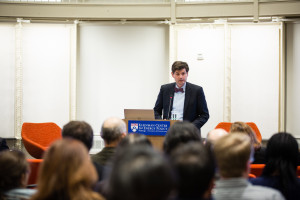
Panelist Roger Cox opens the discussion.
Cox noted that the IPCC report helped convince the court in The Hague that climate change and its potential for global disorder were indisputable. Based on the legal principle that the Dutch government has a duty to protect its citizens from the pending harm, the court directed the government to cut greenhouse gas emissions by twenty-five percent by 2020.
The court concluded that a twenty-five percent reduction was feasible, especially when compared to other countries’ policies. Cox stated that Germany aims to have a forty percent reduction by 2020 and is on its way to reaching this target without adverse economic impacts.
Cox also highlighted the court’s focus on both joint and individual responsibility. The court declared that the Dutch government “should not hide behind the argument that the solution to the global climate problem does not depend solely on Dutch efforts.” The judge reasoned that all countries should individually contribute to solving the problem.
According to Cox, the recent Dutch judicial decision will help the public see that greater emissions reductions are necessary to avert environmental harm. He compared the greenhouse gas emissions reductions to a ban on smoking in cafes: although the policy once seemed unimaginable, after various court rulings society quickly came to accept it.
As the panel discussion at Penn progressed, co-panelist and Brussels-based lawyer Lucas Bergkamp raised concerns about how the Dutch court’s ruling would affect the overall political system.
Bergkamp took issue with the judiciary getting involved in policymaking. Although the district court stated that the decision respected “the government’s scope for policymaking,” Bergkamp claimed the ruling shifted the locus of decision-making away from the legislature—the branch of government responsible for policymaking—to the courts.
According to Bergkamp, the judiciary’s decision to choose a particular policy approach conflicts with a well-accepted separation of powers doctrine that judges should interpret the law rather than make it. Bergkamp expressed concern that advocates in other areas, like health care, could make the same argument that a governmental policy is inadequate and get the court to order the government to enact a different policy. Bergkamp feared this could lead to greater judicial intrusion on the government’s policymaking authority.
Bergkamp worried that a shift in decision-making power to judges would create problems for public accountability. Although legislators can be held accountable for unpopular policy decisions by being voted out of office, judges typically cannot be.
Bergkamp also argued that the ruling affects a range of third parties not represented in the court proceedings.
Cox responded that even though the ruling had political consequences, the court needed to answer the legal question about whether the government had a duty to do more to protect its citizens from global warming.
Cox also noted that the court took a conservative approach by limiting the order to a twenty-five percent reduction in emissions, despite scientific evidence that suggested the reductions should be greater.
Cox denied that the ruling would carry over to other areas. The ruling was a unique situation where there was only one solution, argued Cox, whereas in other areas experts do not agree on a single solution to a problem.
Co-panelist Veerle Heyvaert—a professor at the London School of Economics who has published extensively on environmental and risk regulation—weighed in on the Dutch ruling too.
Heyvaert accepted that the ruling raised questions about separation of powers. However, she argued that the threat to the separation of powers came predominantly from the failure of the legislative branch to hold contemporary governments to account. This failure is all the more pronounced in policy areas characterized by a high level of transnational decision-making, such as climate change.
Heyvaert also addressed the claim that the court’s ruling was needed to protect future generations, noting that global warming is not just an issue that will affect those in the future. Many people today are already experiencing negative impacts from climate change, she said.
The Dutch government recently appealed the district court’s decision. Heyvaert indicated that, although the appeals court might conceivably understand executive discretion in a more extensive way than the district court and on that basis reverse the ruling, there were two outcomes which she hoped would be averted. First, countries’ regional and international climate change commitments, such as those assumed by the Netherlands in the EU context, should not be treated as maximum ceilings that do not allow opt–ups. Secondly, Heyvaert suggested that, however the case is decided on appeal, the court should not send the message that science is too complicated for the courts, as this would lead the judiciary to stay out of issues like climate change and nanotechnology in the future. She argued that in reality courts have an important contribution to make and can develop viable mechanisms for assessing relevant scientific issues.
The panel discussion featuring Heyvaert, Cox, and Bergkamp was co-sponsored by the Penn Program on Regulation, the Kleinman Center for Energy Policy, the Wharton Risk Management and Decision Processes Center, the Department of Germanic Languages and Literatures, the Initiative for Global Environmental Leadership, and the Perry World House, all at the University of Pennsylvania. Penn Law professor Cary Coglianese, director of the Penn Program on Regulation, moderated the discussion.
Video clips of Mr. Cox’s opening remarks along with panel members’ follow-on discussion can be found at the website for the Kleinman Center for Energy Policy. The Kleinman Center was created in 2014 following a gift to PennDesign from Scott and Wendy Kleinman. The Center is located upstairs at Penn’s historic Fisher Fine Arts Library building, where the panel discussion was held.

